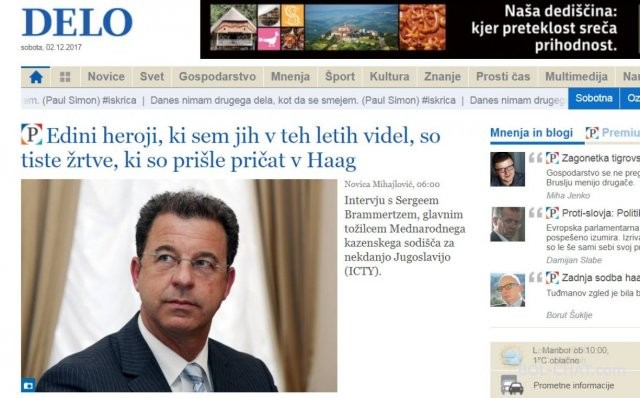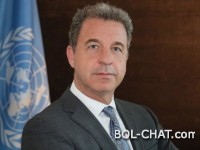Interview / Brammertz: Inmates in The Hague are not heroes but fake defenders
The Hague Tribunal is not a political institution and it did not prosecute the people but responsible for serious war crimes and violations of the Geneva Convention, Chief Prosecutor Serge Brammertz said in an interview for Ljubljana's Delo.
"The convicted perpetrators are not soldiers who fought for their homeland, their villages or families, but commanders who killed prisoners of war protected by the Geneva Convention. There is nothing heroic in burning up the village, moving people out of their homes, or encouraging soldiers to mass sexual violence," he said. Brammertz interviewed during his stay in Slovenia at a recently held seminar for young lawyers, right after Ratko Mladic's conviction.
"It is a condemnation of Mladic and only Mladic, and not the condemnation of the people. It is very important that the community from which the perpetrator understands that we can differentiate it," Brammertz said, adding that the Hague convicts are not heroes but those who are false show the defenders of their people, and in fact they have used and betrayed his trust for his own personal and political interests.
Brammertz said he is currently continuing his work in The Hague to end the transition from the ICTY to the so-called " the residual mechanism, adding that the mechanism goes beyond the remaining procedures in the cases of Stanisic and Simatovic, and the appeals of Karadzic and Mladic, which is of great importance, but that the mechanism will also provide assistance in war crimes trials before national courts.
"Only in Bosnia has more than three thousand unresolved war crimes cases. Our office has nine million pages of conflict documents in the former Yugoslavia and all this information is available to national investigative offices," Brammertz said.
According to him, the current situation regarding the war crimes trial as part of the reconciliation process is not positive.
The procedures in Serbia, Croatia and BiH are slow, and the quality of cooperation among prosecutors' offices in those countries is weaker than a few years ago, among other things, due to the lack of necessary political will.
"In BiH and Serbia, we have yet to establish a new war crimes prosecution strategy, which will surely be included in our report prepared for the UN Security Council. Unfortunately, the quality and extent of cooperation among the countries of former Yugoslavia in this area is decreasing, said Brammertz.

He added that the reason for optimism regarding the future of these processes in the region is given by the fact that with the support of the European Commission, the education program for the past nine years passed 120 lawyers from the region.
"It's a young generation, they have seen closely how the Hague works and the look at them gives me some reason for optimism. After six months, we realized that we are not a political institution, although not everything is perfect in our country," Brammertz said.
He says that it is necessary for politicians to hide from the perpetrators of the crime and do not use nationalist rhetoric, thus "reviving the dark spirits of the 1990s", and that the activities of non-governmental organizations are also important.
Such is the example of an association of young people from Croatia who, with a public letter, apologized to Serbs for crimes committed in Storm, said Brammertz for Delo.
"This is a historical fact that the Croatian side is happy to deny," Brammertz said.
Brammertz said he was pleased with the Karadzic and Mladic judgments and felt "privileged" because of the impacts of those judgments.
These two judgments will have an impact and are of paramount importance. Let's hope this was the last war in Europe. Both Mladic and Karadzic were architects of ethnic cleansing in the middle of Europe, so it is important that they are judged, said Brammertz, adding that encounters with victims of war crimes who testified and who were real heroes gave much more energy than he lost in meeting with war criminals.
Many war criminals are normal people who, in wartime, get out of control and do things that would otherwise be unthinkable, said Brammertz, speaking about his experience with prosecutors at special tribunals against crimes in Rwanda and the former SFRY.
- 3 Dec, 2017
- 1676 views
- No comments


